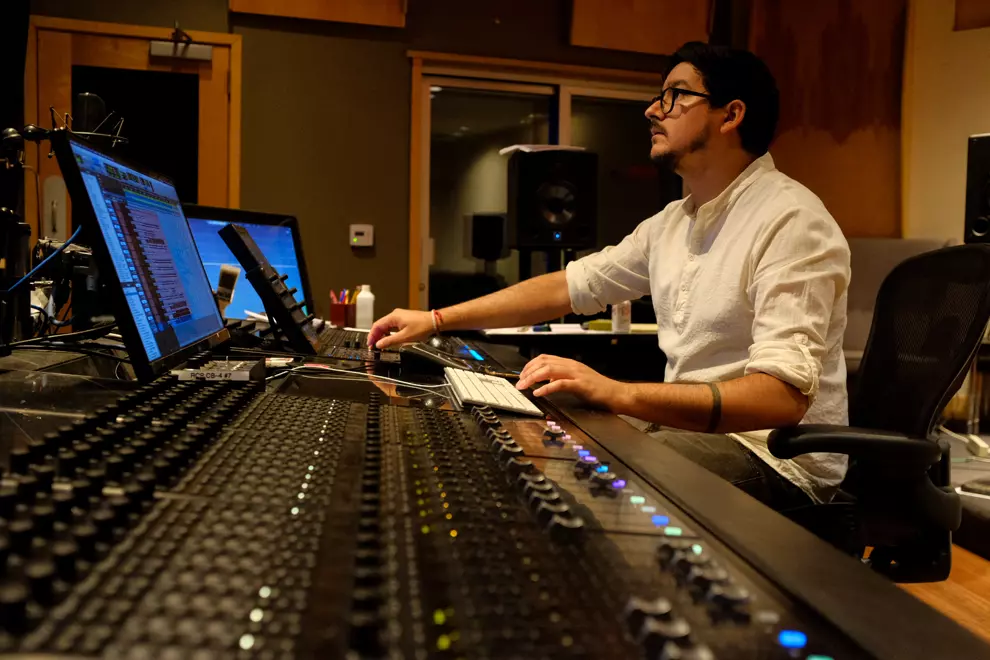Byron Bay SAE Creative Media Institute graduate Aldo Arechar came to Australia from Mexico as a 19-year-old to study at the Northern Rivers campus and complete his Bachelor of Audio Production. Now 34 years old, the composer has worked on film scores with Hans Zimmer, David Fleming, Henry Jackman, and Ludwig Göransson.
Arechar has been living in Santa Monica, Los Angeles, for the last four years. The audio engineer first began studying audio production at SAE because he wanted his music to sound as good as possible, he told Screen Hub. Arechar also credits the institution with helping him understand the business side of the music industry.
"There was a lot to learn about getting a business plan in order. And when I was studying, that was kind of how I knew I needed to learn all the steps for a business plan," he says. "I was ready to get organised, but I didn't know how many things I should consider. The mentorship I received there was really invaluable."
When Arechar first began his studies at SAE, he was amid a "start of adult life crisis," he recalls. "I met so many people from around the world and was outside of my comfort zone. Because I'm from Mexico, speaking English all the time was a different challenge, which made me push myself. The challenges helped me gain an open mindset." The accent barrier was tough, though. "First of all, in Mexico, you learn the American way of speaking English and the accent. So for me, adjusting to the Australian accent was a bit of a shift," he laughs.
Don't miss a beat with our FREE daily newsletter
It took a while for Arechar to go from a university graduate to a Grammy-winning audio engineer. "After I finished uni, I think it took me two years to actually have my path align with what I wanted to do in film," he shares. First of all, he was back living in Mexico City, and the industry was small and competitive.
"I had to find all the jobs within engineering music for post-production in film, but doing follies, sound editing or sound design. But I wouldn't be here if I didn't have that experience. Also, later on, I was thrown into the biggest projects in the world. Would I have landed these jobs if I didn't have that experience in sound design or mixing? I had the edge over people coming from university who didn't have those experiences."
For almost four years, Arechar has worked with Hans Zimmer as part of Zimmer's team at Remote Control Productions. Arechar has contributed his audio engineering skills and experience to films like Dune, Top Gun: Maverick, and The Lion King – the latter for which Arechar was recognised by The Recording Academy. Those films were dream projects to work on, he says.
"The Lion King, I grew up with that score. When I was a kid - I still have my original copy - so having the new CD with my name, my little name, that's still there is incredible," he says with a smile. "I haven't fully grasped how it's changing my life because I've been working non-stop. Whenever I talk to people who have nothing to do with this industry or whatever, I can see that [his achievements] are very important."
Also important is that through his experience, Arechar no longer glamorises the film industry. Like any other workplace, he insists it's full of people who work really hard to get results.
"I stopped romanticising how Hollywood films are done; it's just people," he confirms. "There's something about people's talent and experience that really makes things happen and brings a lot of the magic."
While the audio engineer is constantly working, he sadly can't reveal everything he's been doing. The latest movie he worked on was Florian Zeller's The Son, a film with a stacked cast including Hugh Jackman, Laura Dern, Sir Anthony Hopkins, Vanessa Kirby, and more. He says, "I put my little grains of salt in music cues, which was really good!"
He has some essential points for people studying audio engineering who want to follow in Arechar's footsteps: "Know your technology. It has to be second nature; you could be thrown into a session and be required to know how to record, mix, and add certain things. The more useful you can be to the head of production, the easier it'll be for you to get to where people need you."
Also, you might need to get used to the fact that no day will be the same once you reach a certain level of success in audio production.
For more info on SAE and its courses, click here.
















